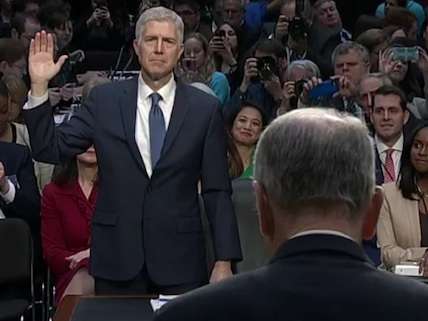Neil Gorsuch, Civil Asset Forfeiture, and the Original Meaning of the 14th Amendment
Where does Justice Gorsuch stand on the Privileges or Immunities Clause?

When President Donald Trump nominated Neil Gorsuch to the U.S. Supreme Court back in January 2017, I observed that one of the biggest unanswered questions about Gorsuch's jurisprudence was where he stood on the crucial debate among conservative and libertarian legal thinkers over whether the Supreme Court should revive and enforce the original meaning of the Privileges or Immunities Clause of the 14th Amendment. Now, thanks a major civil asset forfeiture case that SCOTUS heard last week, we may finally get an answer to that question.
The case is Timbs v. Indiana. At issue is that state's efforts to seize a $40,000 Land Rover LR2 via civil asset forfeiture from a man named Tyson Timbs. Timbs was arrested on drug charges and sentenced to one year home detention and five years probation. A few months after his arrest, the state also moved to seize his car. But a state trial court rejected that forfeiture proceeding on the grounds that it would be "grossly disproportionate to the gravity of [Timbs'] offense" and therefore in violation of the Eighth Amendment to the Constitution, which forbids the imposition of "excessive fines."
But the state lucked out at the Indiana Supreme Court, which held that "the Excessive Fines Clause does not bar the State from forfeiting Defendant's vehicle because the United States Supreme Court has not held that the Clause applies to the States through the Fourteenth Amendment."
It was that question—does the Excessive Fines Clause apply against the states?—that the Supreme Court tackled last week. Justice Gorsuch wasted little time before jumping in.
"Here we are in 2018," an exasperated-sounding Gorsuch told Indiana Solicitor General Thomas Fisher, and we're "still litigating incorporation of the Bill of Rights. Really? Come on, General."
Since the late 19th century, the Supreme Court has been applying—or incorporating—the various provisions contained in the Bill of Rights against the states via the 14th Amendment, which says, "No State shall make or enforce any law which shall abridge the privileges or immunities of citizens of the United States; nor shall any State deprive any person of life, liberty, or property, without due process of law." In other words, if the Free Speech Clause of the First Amendment applies against the states (it does), then the Excessive Fines Clause of the Eighth Amendment deserves the same treatment.
Now here is where things start to get interesting. "We all agree that the Excessive Fines Clause is incorporated against the states," Gorsuch said during the Timbs oral arguments. But he then acknowledged that not everyone on the Court agrees on exactly how it should be done. "Whether you want to do it through the Due Process Clause and look at history and tradition," he continued, "or whether one wants to look at privileges and immunities, you might come to the same conclusion."
Gorsuch was likely thinking about McDonald v. Chicago, the 2010 case in which the Court confronted these questions: Does the Second Amendment right to keep and bear arms apply against the states via the 14th Amendment, and if it does apply, is that because the right to keep and bear arms is a privilege or immunity of U.S. citizenship, or because it is one of the liberties protected by the Due Process Clause?
The Court ultimately ruled 5-4 in favor of Second Amendment incorporation. But only four justices (Roberts, Scalia, Kennedy, Alito) embraced the Due Process Clause. In a lone concurrence, Justice Clarence Thomas argued that fidelity to the original meaning of the 14th Amendment required incorporation via the Privileges or Immunities Clause instead.
What explains this split among the Court's right-leaning justices? The short answer is the fear of "judicial activism." Some conservatives worry that if the Supreme Court embraces the Privileges or Immunities Clause, that clause will then be used to justify greater judicial meddling in future cases. Thomas, by contrast, waved away those concerns in his McDonald concurrence. "The mere fact that the [Privileges or Immunities] Clause does not expressly list the rights it protects," he wrote, "does not render it incapable of principled judicial application."
Timbs v. Indiana has rekindled this conflict. Once again, the Court must decide if and—more importantly—how to apply a provision of the Bill of Rights against the states. Thomas, it is safe to say, has not changed his position. So that's one vote for the Privileges or Immunities Clause in Timbs. But where does Gorsuch stand? When the Court issues its ruling later this term, we may hopefully find out at last.


Show Comments (55)